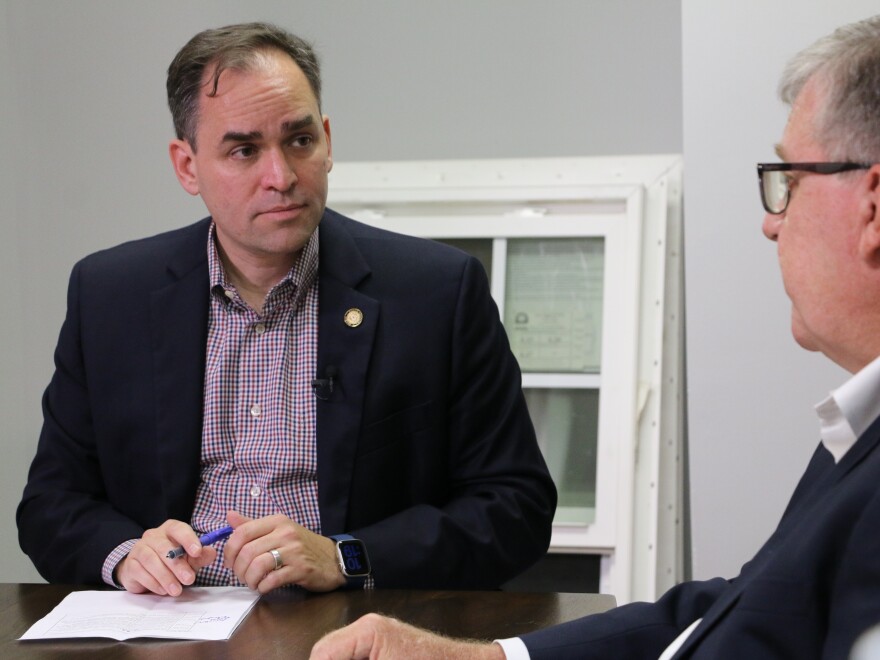Voters in the midterm elections are choosing 435 members of the House of Representatives. But of all those races, fewer than three dozen are competitive — and it's these few districts that will determine which party controls the House.
One of those rare districts is North Carolina's 13th, a newly created district that runs from the city of Raleigh through two suburbs and all the way out into two rural counties.
Bo Hines, the Republican candidate, is a 27-year-old former college football player who describes himself as a "MAGA warrior."
Wiley Nickel, the Democratic candidate, is a state senator who has been running on his experience, aiming his pitch at registered Democrats and voters with no party preference listed.
"It just takes, you know, a smaller group of folks in the center, center-right to say, 'We're tired of it,' and we win this race," Nickel told NPR as he walked door to door in the Raleigh suburb of Cary, handing out campaign literature.

The Hines campaign declined comment for this story. The candidate has been brandishing his endorsement from former President Donald Trump, appearing at a rally with him in the state last month.
"We need conservative fighters that will go on offense, take ground back, just like President Trump did during the course of his administration," Hines said in remarks at a Trump rally in the state last month.

The themes in this race hew closely to the messages the parties have settled on nationally. While both candidates talk about the economy, Hines and his allies have filled the airwaves with ads accusing Nickel of being soft on crime, because of his work as a criminal defense attorney.
Meanwhile, the Democratic candidate and allied outside groups are painting Hines as an extremist, playing up his ties to Trump and an endorsement from Congresswoman Marjorie Taylor Greene. There's also an ad hitting Hines on abortion, which the candidate has described as a genocide.
It's a swing district, but that doesn't mean there's a lot of voters open to persuasion
Outside of early voting sites in the district, a trend quickly emerged in interviews with voters. Even those not registered with a party are casting their ballots with a partisan lens.
Jim Miller described himself as fiercely independent. But he said he couldn't imagine voting Republican this time.
"Hell no to Bo," said Miller, quoting from a Democratic campaign slogan seen on signs throughout the district. "What qualifications does he have?" he said. "Really, I think he's got a lot of growing up to do."
Judy White said she voted for Hines, though she has voted in the past for Democrats. She and her husband Jim said they are deeply concerned about the state of the country, including how divided people are. But, they said they see Democrats as the threat.
"Inflation, schools, the wokeness of what's going on, all of the people with the violence," Judy White said. "Everything's just out of control."
The candidates in this race are leaning into the political divide
The candidates aren't shying away from this division. They're leaning into it, describing it in epic terms.
"This is more than just a political fight. This is spiritual warfare," said Hines in an interview that aired on CBS 17 in Raleigh earlier this month. "It's good versus evil."
This is part of a national trend of widening partisan divisions. A new poll from NBC News found 80% of Democrats and Republicans believe the other party's agenda "poses a threat that if not stopped will destroy America as we know it."
Nickel, the Democratic candidate, also gave a stark warning about the stakes of the race.
"Democracy is on the ballot, and the right to choose is on the ballot and is especially important in this race," he told NPR. "I've served my state in the Senate. And on the other side, we've got an election denier who says he's 100% pro-Trump."
Hines has said he will accept the results of this election, but he was noncommittal in a recent interview about whether Joe Biden won in 2020 fair and square — which Biden did.
Even in a swing district like this one, there just aren't that many swing voters left.
"You would have thought that candidates might focus more on those swing voters to make persuasive arguments," said Mike Rusher, a former Republican Party operative in the state who now works with corporate clients.
"As we approach the finish line, in hindsight, I think people can see why maybe that's not needed in a year like this," Rusher said.
Copyright 2022 NPR. To see more, visit https://www.npr.org.




